Are you a real estate investor struggling to decide between a hard money loan and a traditional bank loan? Choosing the right financing can significantly impact your profitability, cash flow, and investment success.
Hard money loans offer speed, flexibility, and fewer credit restrictions, while traditional bank loans provide lower interest rates and long-term stability. The right choice depends on your investment strategy, financial health, and the urgency of your funding needs.
In this guide, we’ll break down the differences, pros and cons, and best use cases for hard money loans vs bank loans, so you can make the smartest financial decision for your real estate ventures.
What is a Hard Money Loan?
A hard money loan is a short-term financing option provided by private lenders or investment groups. Unlike bank loans, which focus on the borrower’s financial history, hard money loans are based on the value of the property being purchased or renovated.
These loans are commonly used by real estate investors who need quick access to capital for fix-and-flip projects, distressed property purchases, or short-term bridge financing.
Key Features of Hard Money Loans:
- Fast Approval & Funding – Loan approvals typically happen within a few days, allowing investors to close deals quickly.
- Less Stringent Requirements – Lenders focus more on property value than credit score, making it easier for investors with poor credit to qualify.
- Higher Interest Rates – Hard money loans come with interest rates ranging from 8% to 15%, significantly higher than traditional bank loans.
- Short Loan Terms – Terms usually range from 6 months to 3 years, requiring quick repayment or refinancing.
- Flexible Loan Structures – Investors can often negotiate loan terms with lenders to match their investment strategy.
- Collateral-Based Lending – If the borrower defaults, the lender can seize the property to recover the investment.
Hard money loans are best suited for investors who need quick cash flow, are working on fix-and-flip projects, or cannot qualify for bank loans due to credit issues or property conditions.
What is a Traditional Bank Loan?
A traditional bank loan is a long-term financing option that banks, credit unions, or mortgage lenders provide. It is commonly used for buy-and-hold investments, rental properties, and primary residences.
Bank loans focus heavily on borrower qualifications, including credit score, debt-to-income ratio, and financial history. They offer lower interest rates but require longer approval times and extensive documentation.
Key Features of Traditional Bank Loans:
- Lower Interest Rates – Bank loans typically range from 3% to 7%, making them the cheapest long-term financing option.
- Strict Qualification Requirements – Banks require good credit scores (typically 650+), stable income, and a low debt-to-income ratio.
- Longer Approval Process – The application process can take weeks or months, delaying investment opportunities.
- Long Loan Terms – Standard loan terms are 15 to 30 years, allowing for lower monthly payments.
- Lower Fees – Banks usually have lower origination fees and closing costs than hard money loans.
- Better for Rental Properties – Ideal for investors looking for long-term financing with lower repayment risks.
Traditional bank loans work best for buy-and-hold investors, those with strong credit, and investors who do not need immediate funding to close deals quickly.
Which Loan is Better for Real Estate Investors?
Choose a Hard Money Loan If:
Need quick funding for a time-sensitive deal.
If you are working on a fix-and-flip project or a distressed property.
Your credit score isn’t high enough to qualify for a bank loan.
You need flexible lending terms that can be customized.
Choose a Traditional Bank Loan If:
Buying a long-term rental or primary residence.
Have a strong credit history and can meet strict bank requirements.
If you want lower interest rates and lower overall borrowing costs.
You don’t need immediate funding and can wait for loan approval.
FAQs
1. How quickly can I get approved for a hard money loan?
Hard money loans can often be approved within 24 to 72 hours, making them one of the fastest financing options for real estate investors.
2. What are the typical interest rates for hard money loans?
Interest rates range between 8% and 15%, depending on the lender, property type, and borrower experience.
3. Do hard money lenders require a credit check?
Many hard money lenders focus primarily on the property’s value rather than the borrower’s credit score, making them accessible to investors with poor or no credit history.
4. What types of properties can be financed with hard money loans?
Hard money loans can finance residential, commercial, industrial, and land properties, especially those that need renovations.
5. Are hard money loans only for real estate investors?
While primarily used by real estate investors, hard money loans can also be an option for developers and property owners seeking short-term financing.
Need Fast and Flexible Financing?
If you’re looking for a construction loan, bridge loan, or fix-and-flip loan, Trentium Capital can help!
We provide:
Fast approvals – Close deals quickly with 24 to 72-hour funding.
Competitive rates – Affordable financing for your next real estate project.
Customized loan solutions – Tailored to your investment goals.
📞 Contact Trentium Capital today and secure the best financing option for your real estate investments!



